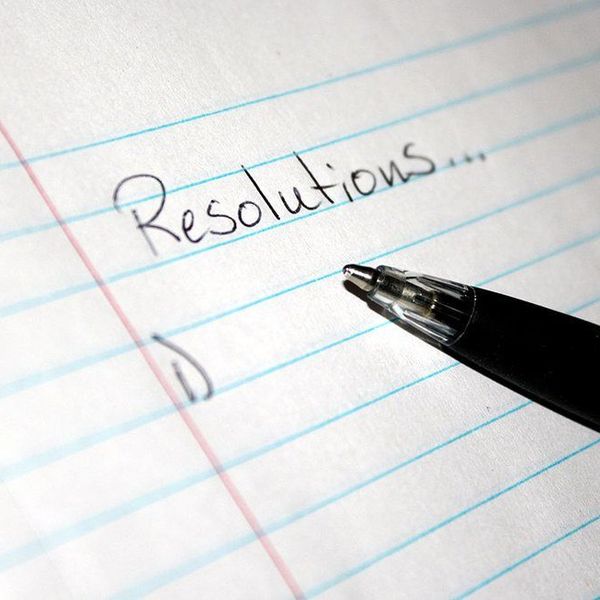I don't do new year's resolutions because I am bad at keeping them.
I think it's safe to say that, in the spirit of the holidays, we all get a little bit overconfident in ourselves and get caught up in our resolution making. We all see the posts. "New year, new me" really means "I will continue to be basically the same person I have always been with a potentially new hairstyle." "Gonna go to the gym everyday!" translates to "I'm going to go religiously for exactly three weeks, be tired for one day, and never return.
No, I don't like to do new year's resolutions because I know myself well enough to know that I do not have the willpower necessary to follow through with any resolution I make for myself. Instead, I've been taught by a pair of ancient beings known as Mom and Dad to establish goals for myself. You may ask yourself, "but Miguel, a goal and resolution are the same thing!" And to that I respond with a firm, "No."
See, a resolution is an intangible concept: it's a decision. Decisions have no means of being measured, and as such are unreliable markers of progress. A goal on the other hand is real, or so my parents put it. Full disclosure, I thought this was 100 percent garbage at first and thought to myself, "wow, my dad is getting old very quickly." However, in hindsight where everything is clearer, I realize he made a lot of sense.
Some late night thinking and a few days later, I realized that the reason New Year's Resolutions fall short for so many people is because they're simply too abstract. They change as we feel so it becomes a finish line that we can never reach. We never finish resolutions because there is no finish. A goal on the other hand is a destination. It's a place that you establish and work your way towards. Where resolutions are akin to a carrot hanging in front of your face attached to a stick on your back, a goal is the next rung on a ladder, or a checkpoint in a race.
There are five very important criteria for a goal to be any more effective than its resolution cousin. Let's take for example a very common new year's resolution: losing weight. the resolution version of this would be, "I will lose weight this year!" End of story.
A goal is specific, measurable, actionable, reasonable, and time-based. SMART. A cheesy acronym, but fully effective.
One must specify what it is they want to accomplish, in this case losing weight and keeping it off. Resolutions often stop with "losing weight", and when people start to regain the pounds lost they feel as though they had failed. A goal explicitly states what it is you want, with no implications.
The follow-up is to be measurable. How much weight do you want to lose? Five pounds? 10? 50? If your goal is to simply "lose weight", then all you have to do is use the bathroom after eating a buffet and you'll have lost three pounds right there.
The next checkpoint is to ensure your goal is actionable, meaning that you can act upon it. There's no point in establishing a goal that you can do nothing about, right? This is where planning happens and you start to write down your game plan. "I'll start by cutting out all sugary foods and going cold turkey on my favorite burrito and cease to eat anything that came from animals and I'll go to the gym every single day for five hours!" That was an example of what not to do.
The next step, reasonable, is a reality check. If you've ever seen me, I'm a rather hefty dude. I like my sleep, eating is my best friend, and my metabolism is as fast as I am (meaning it gets tired after going up five stairs). I will definitely not make it to the gym every day for five hours, much less the rest of that initial goal. Be real with yourself. Look in the mirror and be 100 percent true to who you are, or else everything will be far less effective.
Lastly, time-based. When do you want to have lost your 25 pounds? By next week? Be realistic, remember. This is where I must cite the human tendency to follow the Procrastination Law, where a task to be accomplished in a given amount of time will expand to take up that much time. If you tell yourself that you'll lose weight in six months, then it will take six months, possibly longer. Very rarely will it take less time. Take this into consideration, cause giving yourself too much time leaves a lot of room for laziness to creep in.
In the end, that's just what I do. It's grown into a habit and I set myself numerous goals, both big and small ranging from "I will be able to lift my body weight at the gym by December 25th, 2017" to "I will finish this bowl of cereal so I can go back to sleep."
But all of this can be ignored if you remember one very simple mantra, "Aim high, and hit the mark!"





















